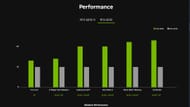The Nvidia RTX 5070 has been unveiled at the CES 2025 event. The GPU has been advertised to be as fast as the RTX 4090 in the latest video games with AI features such as DLSS 4 enabled. This is a bold claim, as the 90-class GPU is one of the most powerful cards ever made that delivers 42% more performance than the 4070 Super.
However, how does the 5070 compare with the last-gen 4080? The new 70-class offering costs about half that of the $999 GPU, making it a considerable option in 2025. Although it's pretty early to draw an accurate conclusion, let's look at the video cards' hardware details and try to come up with an answer.
NOTE: Parts of this article are subjective and reflect the writer's opinion.
Both the RTX 5070 and RTX 4080 are strong 1440p and 4K gaming GPUs

The RTX 4080 was launched as a 4K gaming beast. It still delivers sky-high framerates in the latest titles with little to no compromises. The upcoming 5070 is routed to be a strong competitor, especially with the new multi-frame generation tech. Let's look at what each GPU brings to the table.
Specs comparison
The RTX 5070 has received quite a specs bump as compared to the last generation. The card is powered by the GB205 graphics chip, a slightly cut-down version of the GB202 and 203 found on the higher-end 5080 and 5090. While this means fewer core counts, the operating power limits have gone down as well, thereby cutting the need for a beefy power supply.
The 5070 has 6,144 CUDA cores, which might seem like a step down from the 4080's 9,728. However, each individual core on the newer card is more capable than the previous generation, resulting in better performance.
On top of this, you also get a 250W power budget with the 5070. However, the 70-class GPU ships with 12 GB of video memory as compared to the 4080's 16 GB. The Blackwell card is based on GDDR7, which helps it catch up with the 4080's larger memory buffer in terms of total bandwidth.
The 5070 has a real lead in prices. The card starts at $549, whereas the 4080 debuted at $1,199. The 4080 Super, which is currently available, costs $999.
The detailed specs of the two GPUs are as follows:
Read more: Nvidia RTX 5090 vs RTX 4090
Performance comparison

It's still pretty early to gauge how the performance details of the RTX 4080 and the 5070 will compare. The Blackwell card doesn't launch until February, which leaves us with just the demos and performance comparisons Nvidia has released to work with.
It's worth noting that the company hasn't shown any specific charts comparing the 5070 and 4080 specifically. However, we have some numbers showcasing how the card stacks up against the 4070. Across the board, we are looking at 30-100% better framerates depending on the video game.
These numbers are with DLSS 4 multi-frame generation turned on. What remains to be seen is how the rasterization performance compares. If we factor the RTX 4080 in, the gains would be thinner, with similar performance to 20-30% gains depending on the game and workload.
Do note this is assuming linear scaling, which isn't quite the case for GPUs with extra VRAM and ray tracing capabilities.
Nvidia RTX 5070 vs RTX 4080: Final thoughts
For the bottom line, the RTX 5070's price and competitive performance make it seem promising. Gains in rasterization metrics are often what matters the most for users. We don't have much information about how exactly raw rendering performance is going to compare. For now, it's best to hold upgrading until next month when next-gen offerings become commonplace.
